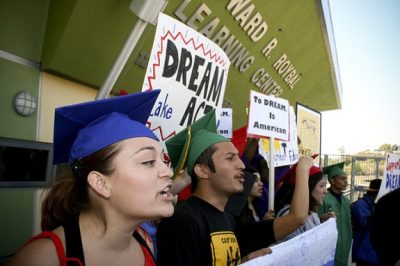DACA/DAPA
Deferred Action for Childhood Arrivals (DACA) and Deferred Action for Parents of Americans and Lawful Permanent Residents (DAPA) offer certain immigrants protection from immediate deportation and other benefits. Learn more about these policies, how they affect America, and our work to strengthen them below.

DHS Announces Application Process for Deferred Action, IPC Provides Data on Where Eligible Individuals Reside
Washington D.C. – Today, U.S. Citizenship and Immigration Services (USCIS) released important details about the Deferred Action for Childhood Arrivals (DACA) process, which will temporarily allow some eligible youth to go to school and work without fear of deportation. A recent Immigration Policy Center (IPC) report,Who and… Read More

How Should Obama Administration Proceed with Deferred Action Program?
In a June 15th memo announcing deferred action for immigrant youth, DHS Secretary Janet Napolitano gave USCIS 60 days to come up with a process that will allow these young people to affirmatively apply for the chance to work, study, and live in the U.S. without fear of deportation. To be sure, USCIS staff and their counterparts at ICE, CBP, and DHS, have been entrusted with a difficult job—one that requires balancing legal and practical implementation issues against high expectations and years of built up frustration over the lack of immigration reform. But the real challenge is acknowledging that every single decision they make about the program has the chance to make it harder or easier for young people to realize their dreams. Read More

Economic Benefits of Granting Deferred Action to Unauthorized Immigrants Brought to U.S. as Youth
There are an estimated 1.4 million children and young adults in the United States who might benefit from President Obama’s announcement that the Department of Homeland Security would begin granting deferred action (and Employment Authorization Documents) to unauthorized immigrants who were brought to the United States as minors. For many of these young people, the United States is the only home they know and English is their first language. Each year, tens of thousands of them graduate from primary or secondary school, often at the top of their classes. They have the potential to be future doctors, nurses, teachers, and entrepreneurs, but their lack of legal status has prevented them from attending college or working legally. The President’s deferred action initiative will provide an opportunity for them to live up to their full potential and, in the process, make greater contributions to the U.S. economy. Read More

Dream Come True: Obama Administration Announces Relief for DREAMers
Washington. D.C. – The American Immigration Council applauds today’s announcement by the Obama administration that it will grant deferred action to undocumented youth who were brought to the United States as small children and who have been raised and educated in communities around the country. Today’s announcement builds on the… Read More

Dissecting the HALT Act: Last Safety Valves in Immigration System Under Attack
Washington D.C. – Tomorrow, Tuesday, July 26, the House Judiciary Subcommittee on Immigration Policy and Enforcement will hold a hearing on the “Hinder the Administration’s Legalization Temptation Act” (HALT Act), a bill that would suspend discretionary forms of immigration relief until January 21, 2013—the day after the next Presidential inauguration. Read More

Investing in the American DREAM
Each year, tens of thousands of undocumented immigrant students graduate from American high schools and embark on uncertain futures. Their inability to legally work and receive financial aid stalls, detours, and derails their educational and economic trajectories. Most importantly, at any time, they can be deported to countries they barely know. The Development, Relief, and Education for Alien Minors (DREAM) Act is a federal bill aimed at providing immigration relief to these young people. The passage of this bill would grant many undocumented youth access to legal residency and federal financial aid—thus removing legal and economic barriers to higher education and increasing their contributions to America and the likelihood of upward mobility. Read More
Make a contribution
Make a direct impact on the lives of immigrants.
